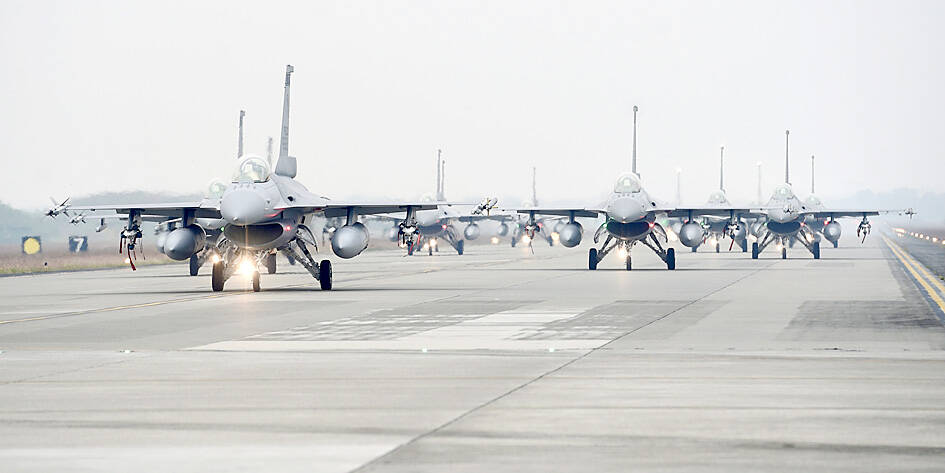Runways at seven airports are to be widened to make them more resilient to a potential missile attack from China, a source from the Ministry of National Defense said yesterday.
Ministry officials and US advisers made the decision after reviewing data from Han Kuang military exercises, the source said, adding that runways would be widened to 60m.
The adjustment would allow runways to more quickly be repaired so that fighter jets could take off and land, and would make the runways usable by B-52 bombers and large transport aircraft, the source said.

Photo: Lo Pei-de, Taipei Times
In a combat scenario, China would likely target Taiwan’s air bases, so the ministry is preparing by widening runways and performing annual repair drills, the source said.
The runway of the Ching Chuan Kang (清泉崗) Air Base in Taichung, which was originally built with the assistance of the US military, is 60m wide, as it was built to accommodate B-52 bombers. It was decided that runways at Taiwan’s other bases, which are 45m to 50m in width, should be widened to match that of Ching Chuan Kang, the source said.
“If runways are hit by surface-to-surface missiles or other weapons during wartime, takeoff and landing operations might be paralyzed — so we need to be prepared for that,” the source said.
Assuming that a runway is struck by Chinese ballistic missiles with an accuracy of less than 50m and a destruction radius of 25m, six missiles would give China an 80 percent chance of destroying the runway, the source said.
Potentially, China could destroy a runway with two missiles fired in short succession at a target with a radius of 100m, the source said.
“It’s not guaranteed that China would hit its target, but we must be ready to restore a runway should it be hit, and widening runways is the best way to accomplish that,” the source said.
The main runways of air bases have shoulders and buffer zones about 7.5m to 15m in width, which could be quickly reinforced by widening them, the source said.
Air force personnel have undergone runway repair training in the US, as well as at Ching Chuan Kang, the source said.
“During the last drill, the army’s unexploded ordinance disposal team used 18kg of TNT to blast holes in the base’s taxiway, simulating an enemy attack,” the source said. “The blast created a 2m-deep hole with a radius of 20m that teams used for the drill, which involved removing foreign objects, laying fiberglass repair kits, backfilling the crater and compacting it.”
During the drill, a minimum operating strip with a length of 1.5km and a width of 15m was opened to allow the resumption of aircraft takeoffs and landings in the shortest possible time, the source said.
Air force personnel have shortened runway repair times from four hours for one or large crater repair operations, down to 2.5 hours, the source said.

NATIONAL SECURITY THREAT: An official said that Guan Guan’s comments had gone beyond the threshold of free speech, as she advocated for the destruction of the ROC China-born media influencer Guan Guan’s (關關) residency permit has been revoked for repeatedly posting pro-China content that threatens national security, the National Immigration Agency said yesterday. Guan Guan has said many controversial things in her videos posted to Douyin (抖音), including “the red flag will soon be painted all over Taiwan” and “Taiwan is an inseparable part of China,” while expressing hope for expedited “reunification.” The agency received multiple reports alleging that Guan Guan had advocated for armed reunification last year. After investigating, the agency last month issued a notice requiring her to appear and account for her actions. Guan Guan appeared as required,

A strong cold air mass is expected to arrive tonight, bringing a change in weather and a drop in temperature, the Central Weather Administration (CWA) said. The coldest time would be early on Thursday morning, with temperatures in some areas dipping as low as 8°C, it said. Daytime highs yesterday were 22°C to 24°C in northern and eastern Taiwan, and about 25°C to 28°C in the central and southern regions, it said. However, nighttime lows would dip to about 15°C to 16°C in central and northern Taiwan as well as the northeast, and 17°C to 19°C elsewhere, it said. Tropical Storm Nokaen, currently

‘NATO-PLUS’: ‘Our strategic partners in the Indo-Pacific are facing increasing aggression by the Chinese Communist Party,’ US Representative Rob Wittman said The US House of Representatives on Monday released its version of the Consolidated Appropriations Act, which includes US$1.15 billion to support security cooperation with Taiwan. The omnibus act, covering US$1.2 trillion of spending, allocates US$1 billion for the Taiwan Security Cooperation Initiative, as well as US$150 million for the replacement of defense articles and reimbursement of defense services provided to Taiwan. The fund allocations were based on the US National Defense Authorization Act for fiscal 2026 that was passed by the US Congress last month and authorized up to US$1 billion to the US Defense Security Cooperation Agency in support of the

PAPERS, PLEASE: The gang exploited the high value of the passports, selling them at inflated prices to Chinese buyers, who would treat them as ‘invisibility cloaks’ The Yilan District Court has handed four members of a syndicate prison terms ranging from one year and two months to two years and two months for their involvement in a scheme to purchase Taiwanese passports and resell them abroad at a massive markup. A Chinese human smuggling syndicate purchased Taiwanese passports through local criminal networks, exploiting the passports’ visa-free travel privileges to turn a profit of more than 20 times the original price, the court said. Such criminal organizations enable people to impersonate Taiwanese when entering and exiting Taiwan and other countries, undermining social order and the credibility of the nation’s